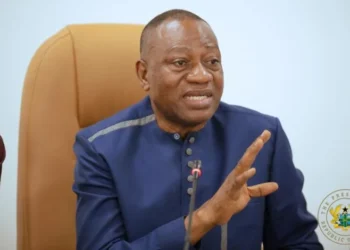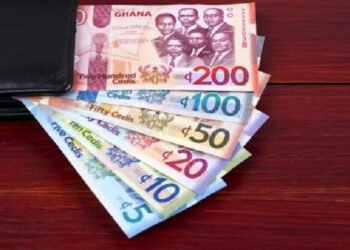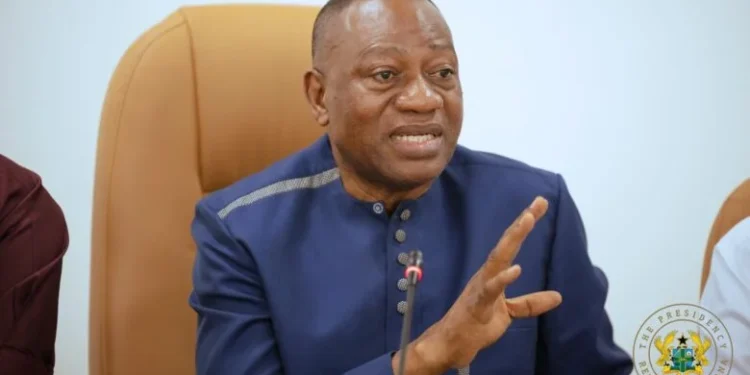Ghana’s economic trajectory has once again taken center stage on the global front, as the International Monetary Fund (IMF) is conducting its fifth review of the country’s $3 billion Extended Credit Facility (ECF) programme.
According to Stanbic Bank Ghana, the country’s steady fiscal discipline, improving macroeconomic indicators, and policy reforms have positioned it strongly ahead of this critical assessment.
Mrs. Oforiwa Attipoe, Manager for Global Markets at Stanbic Bank Ghana, commended the progress, stressing that the fifth review is not merely a routine exercise but a significant milestone. “The fifth review is not just a check-in; it is a milestone that reflects how far Ghana has come,” she noted. Her remarks underscore growing confidence in Ghana’s ability to sustain its recovery momentum while meeting the IMF’s stringent targets.
Disbursements and Market Confidence
Since the launch of the ECF programme in May 2023, Ghana has already received $2.3 billion in disbursements out of the total $3 billion package. These funds have been instrumental in stabilizing the economy, shoring up reserves, and rebuilding investor confidence. With just two tranches of $370 million pending, the fifth review will play a decisive role in unlocking the next disbursement, further consolidating Ghana’s progress.
Analysts argue that the IMF’s endorsement at this stage could boost Ghana’s credibility in the eyes of international investors, leading to stronger inflows of capital and deeper engagement with global financial markets.
Inflation on the Decline
One of the most remarkable achievements highlighted by Stanbic Bank is Ghana’s sustained decline in inflation. From a high of 23.5% in January 2023, inflation has consistently fallen for eight consecutive months, reaching 11.5% by August 2025. This downward trajectory has been driven by easing food and non-food prices, supported by a stronger cedi.
With the government targeting 10.7% by year-end, projections suggest Ghana could return to single-digit inflation by 2026—a development that would mark a major milestone in restoring economic stability. For many households, this translates into better purchasing power, reduced cost of living pressures, and renewed optimism about the future.

Cedi Stability and Forex Reforms
The Bank of Ghana’s decisive interventions have also played a crucial role in stabilizing the local currency. Measures such as redirecting foreign exchange inflows from mining companies to commercial banks have increased market liquidity, reduced speculation, and supported foreign trade.
Currency stability has historically been a challenge for Ghana, often undermining investor confidence and fueling inflation. However, the cedi’s resilience in recent months has signaled a break from the past, positioning the country as a more reliable investment destination.
The IMF’s current review will also focus on Ghana’s progress with debt restructuring and fiscal reforms. Stanbic Bank emphasized that the government’s commitment to restructuring debt while enforcing stronger fiscal controls has been key to stabilizing public finances.
Fiscal consolidation efforts, such as improved revenue mobilization and expenditure management, are now bearing fruit. Mrs. Attipoe stressed that Ghana’s progress in these areas has been “critical to reinforcing investor confidence and sustaining the economic recovery momentum.”
Global Spotlight and Investor Optimism
Ghana’s economic revival is drawing international attention, not only because of its success in reversing years of fiscal distress but also because of its broader implications for other African economies under IMF-backed programs.
According to Mrs. Attipoe, the outcome of the fifth review will be closely monitored by global investors, development partners, and policymakers alike.
“A successful review will not only unlock additional funding but also signal to global markets that Ghana’s economic turnaround is firmly on course.”
Mrs. Attipoe

With two reviews left before the ECF programme concludes in May 2026, Ghana’s challenge will be to maintain fiscal discipline while consolidating recent gains. Continued reforms in governance, public financial management, and structural policy adjustments will be essential to ensure long-term stability.
Ghana’s ability to balance fiscal prudence with social spending will also be tested, especially as pressures mount to protect vulnerable groups and stimulate sustainable growth. Still, with a track record of consistent progress and the IMF’s support, the country appears firmly on the path toward economic resilience.
Ghana’s economic turnaround story is fast becoming one of discipline and cautious optimism. With inflation easing, the cedi holding firm, and debt restructuring on track, the country stands poised for a successful IMF fifth review. Stanbic Bank’s endorsement further strengthens the narrative that Ghana’s revival is not only real but also gaining international recognition.
READ ALSO: Replace Council of State, House of Chiefs with Senior House – CDD-Ghana’s Aku Kwapong























